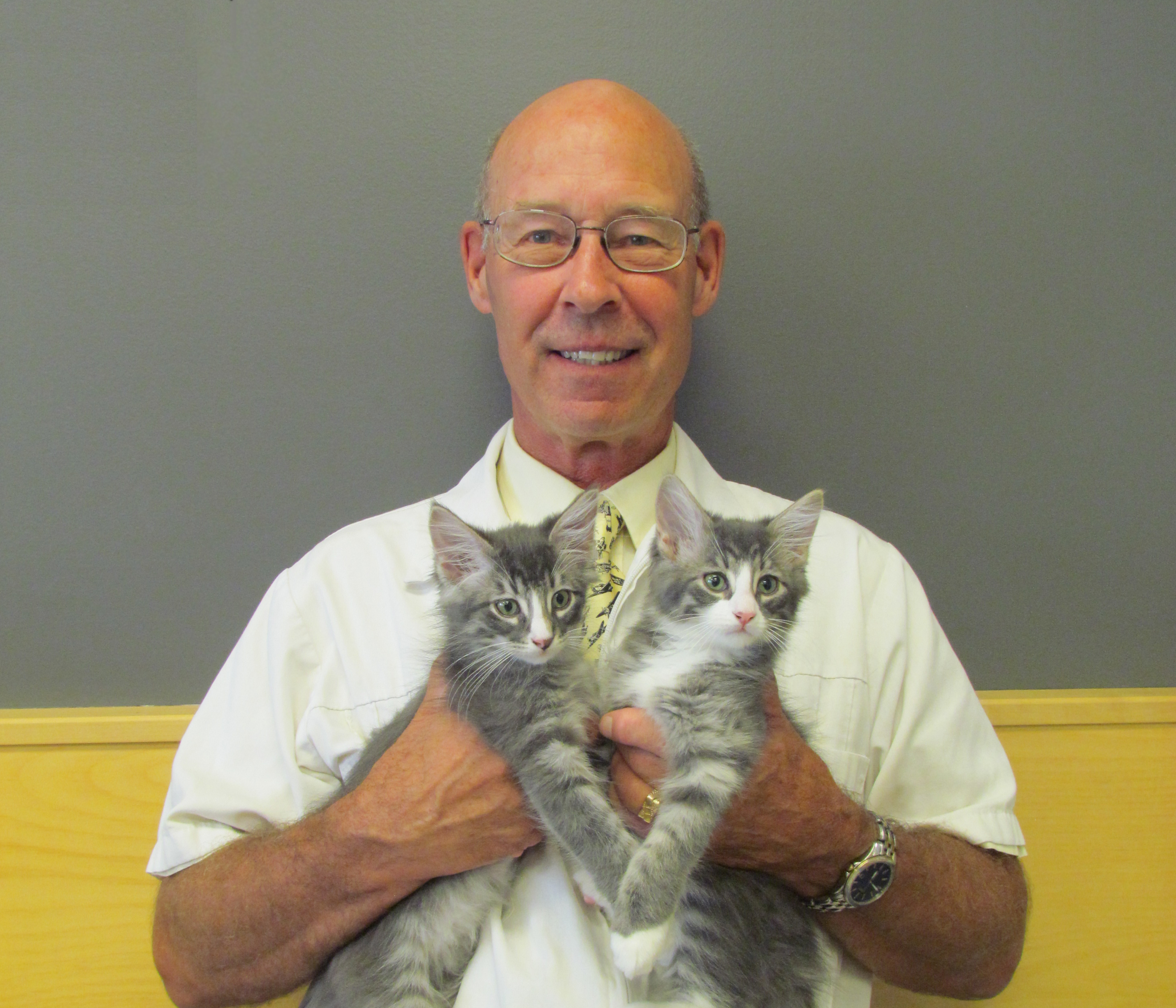
Pets bond Gibbs’ work and life
Dr. Brian Gibbs' decision to become a veterinarian was greatly influenced by one person: his grandmother.
By Lynne Gunville
"She was probably the last person in Saskatoon to raise chickens and sell eggs," says Gibbs. "And when I was a kid, I used to catch the city bus over to her place on Friday nights and spend the weekend helping her. I'd look after her dogs and cats, feed the chickens, pick and clean the eggs – I just really liked doing that."
Gibbs was always most interested in working with small animals, and after graduating from the Western College of Veterinary Medicine in 1970, he went on to work at Whitebirch Animal Hospital (now Westward Animal Hospital) in his home town of Saskatoon.
In 1975, he purchased the Central Animal Hospital. Although his clinic was one of just a few small animal clinics operating at that time, Gibbs says that, over the years, he has witnessed a major shift in people's attitudes toward their pets.
"Pets are no longer considered chattels today. They've moved from the yard to the house to the bed in a generation. I think it's an evolution through society, and it's difficult to come up with a single explanation. But whatever the reason, pets have become more important to people today than they were in the past."
Pets have always been important to Gibbs who can recall very few times in his life when he didn't have his own dog. He now has four pets – a cat and three dogs – that live on the family acreage. His dogs, an Alaskan malamute and two standard poodles, were all adopted as adults from people who couldn't keep them for various reasons.
For Gibbs, work has always been a source of great satisfaction: "I've always enjoyed making a diagnosis that was elusive – it's the thrill you get when you find the answer. I also like the idea of making something better that wasn't well, and I guess that goes along with the idea of making clients happy because we've made their pet well."
Over the years, Gibbs has been a staunch supporter of the WCVM as well as the Companion Animal Health Fund (CAHF). He's gratified that the fund has been so well used over the years in its support of studies that have brought about huge gains in small animal medicine.
"But like all charities, they have difficulty getting funding, and there are so many other organizations out there competing for the money. That's why we've decided that our clinic's charitable donations will always be related to animal health and welfare," explains Gibbs.
"We identify with the pets – that's why I went into veterinary medicine. It's all about working with the pets."
Gibbs was always most interested in working with small animals, and after graduating from the Western College of Veterinary Medicine in 1970, he went on to work at Whitebirch Animal Hospital (now Westward Animal Hospital) in his home town of Saskatoon.
In 1975, he purchased the Central Animal Hospital. Although his clinic was one of just a few small animal clinics operating at that time, Gibbs says that, over the years, he has witnessed a major shift in people's attitudes toward their pets.
"Pets are no longer considered chattels today. They've moved from the yard to the house to the bed in a generation. I think it's an evolution through society, and it's difficult to come up with a single explanation. But whatever the reason, pets have become more important to people today than they were in the past."
Pets have always been important to Gibbs who can recall very few times in his life when he didn't have his own dog. He now has four pets – a cat and three dogs – that live on the family acreage. His dogs, an Alaskan malamute and two standard poodles, were all adopted as adults from people who couldn't keep them for various reasons.
For Gibbs, work has always been a source of great satisfaction: "I've always enjoyed making a diagnosis that was elusive – it's the thrill you get when you find the answer. I also like the idea of making something better that wasn't well, and I guess that goes along with the idea of making clients happy because we've made their pet well."
Over the years, Gibbs has been a staunch supporter of the WCVM as well as the Companion Animal Health Fund (CAHF). He's gratified that the fund has been so well used over the years in its support of studies that have brought about huge gains in small animal medicine.
"But like all charities, they have difficulty getting funding, and there are so many other organizations out there competing for the money. That's why we've decided that our clinic's charitable donations will always be related to animal health and welfare," explains Gibbs.
"We identify with the pets – that's why I went into veterinary medicine. It's all about working with the pets."
